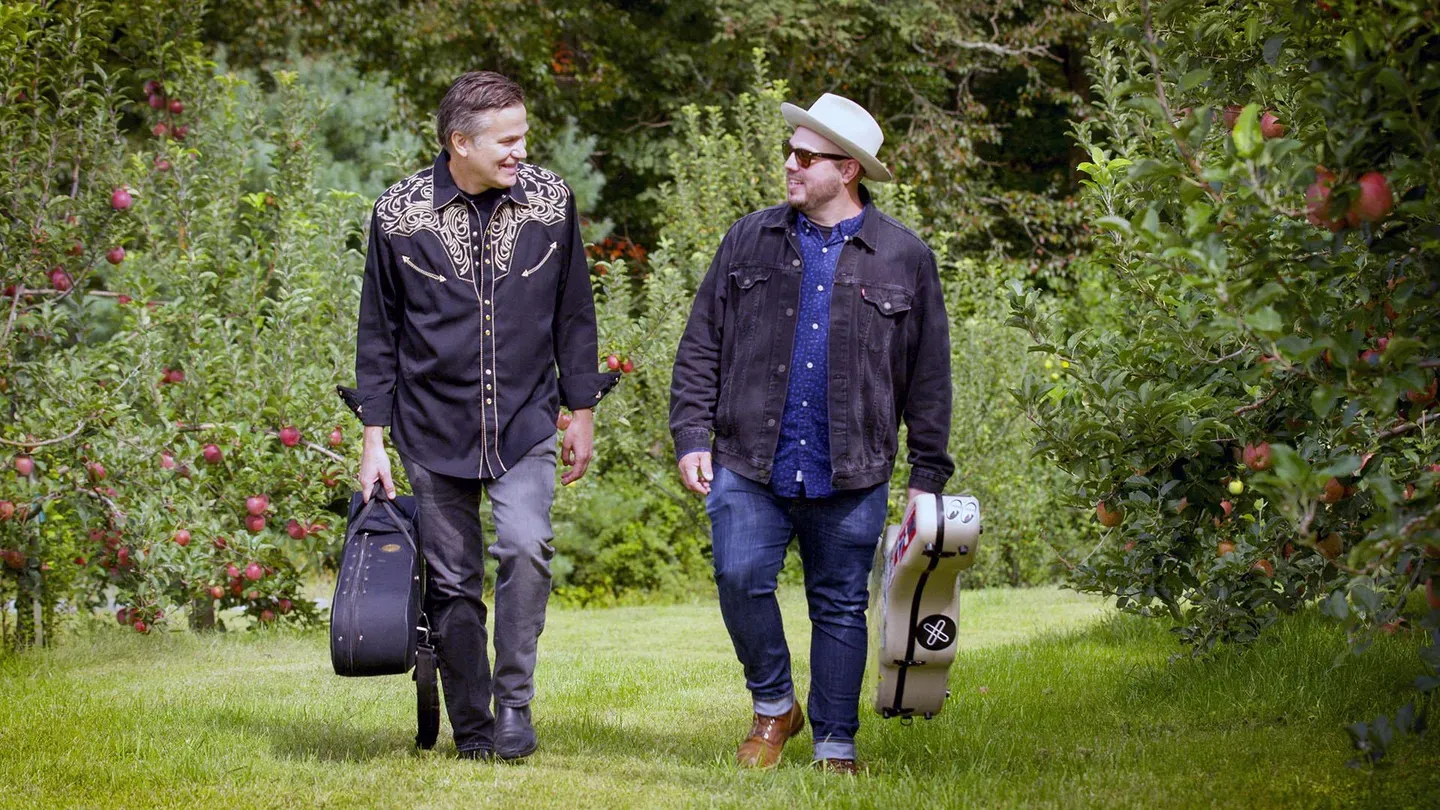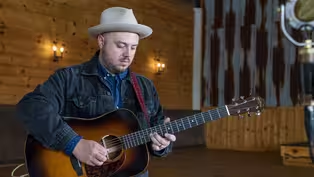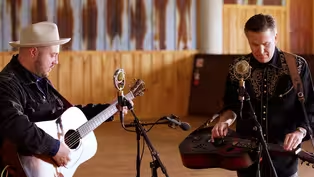

Rob Ickes and Trey Hensley
Season 5 Episode 6 | 24m 41sVideo has Closed Captions
The electrifying duo of Rob Ickes and Trey Hensley visit with host David Holt.
Rob Ickes played dobro in the award winning bluegrass band Blue Highway. He left that band to work with phenomenal young singer and guitarist Trey Hensley, whose performances dazzled Earl Scruggs, Marty Stuart, and other country legends.
Problems playing video? | Closed Captioning Feedback
Problems playing video? | Closed Captioning Feedback

Rob Ickes and Trey Hensley
Season 5 Episode 6 | 24m 41sVideo has Closed Captions
Rob Ickes played dobro in the award winning bluegrass band Blue Highway. He left that band to work with phenomenal young singer and guitarist Trey Hensley, whose performances dazzled Earl Scruggs, Marty Stuart, and other country legends.
Problems playing video? | Closed Captioning Feedback
How to Watch David Holt's State of Music
David Holt's State of Music is available to stream on pbs.org and the free PBS App, available on iPhone, Apple TV, Android TV, Android smartphones, Amazon Fire TV, Amazon Fire Tablet, Roku, Samsung Smart TV, and Vizio.
Buy Now
Providing Support for PBS.org
Learn Moreabout PBS online sponsorship(upbeat bluegrass music) (really fast guitar and dobro) - I want you to meet the acoustic duo of Rob Ickes and Trey Hensley.
Ickes is a veteran instrumentalist who won the International Bluegrass Music Association's Dobro Player of the Year an unprecedented 15 times.
He left his band of 20 years, Blue Highway, to focus on playing with Trey Hensley, a young guitar prodigy who made his Grand Ole Opry debut at the age of 11.
As a duo, they keep the listener on the edge of their seat with their incredible virtuosity with their incredible virtuosity How did you guys get together as a duo?
- I actually met Trey when he was a little guy.
I was playing with Earl Scruggs and they met on the Grand Ole Opry when Trey was just 11.
Marty Stewart had heard Trey play.
He'd only been playing guitar a few months-- - Oh, that's incredible, man.
- Marty was so impressed.
He invited him to the Opry with him a few weeks later.
And that's where Trey met Earl.
So we met at the Tennessee Theater in Knoxville.
- You were both doing a show?
- Well, see, Earl was a huge fan of Trey's, and so he would invite Trey to sit in with us whenever we played in East Tennessee.
Then he moved to Nashville a few years ago, so we just started doing some shows together.
And I was really just trying to kind of introduce him around to people around town and get him started in Nashville.
And you know, every time we played together it was just so much fun.
And we're both into lots of different music, of course we have backgrounds in bluegrass and country, but we love the blues and jazz and lots of different styles.
And the more we kept playing, it's like, "Man, we can do anything we want.
"It's really fun."
- Are there any other advantages of being a duo besides just hitting it off and clicking?
- Yeah, I mean, I think it seems like the synchronicity on stage is a little easier to grab a hold of with just two people.
We're pretty much on the same brain wave all the time.
It travels pretty easy.
- I would think what would be hard for the two of you is that you're both playing so fast and so accurately.
- It's funny, like Trey was saying, when you're on stage with a whole band, often, y'all aren't on the same page.
'Cause you can't hear each other well or whatever.
And when there's just two of you even if the sound is not great, he's here, I'm here, and we can grab on to each other and just go with it.
And also, there's a lot of improvisation going on when we're playing and we're just kind of always there for each other.
He can go wherever he wants to and I'm going to try and have that rhythm and stuff laying it down for him.
And I know he does the same for me.
So I think it's kind of a trust thing that happens.
On the downside of playing duos is it's kind of nerve wracking.
'Cause like you said, if you're not there, you know you're not there.
He knows you're not there.
- [David] The audience knows.
- Everybody in the audience knows.
("Born with the Blues") ♪ Well it's time that I left Mobile ♪ ♪ I'm thinking Memphis Tennessee ♪ ♪ Well it's bye bye Mobile ♪ Hello Memphis Tennessee ♪ Well if I aint there by midnight ♪ ♪ Baby don't wait up for me ♪ With blood on my hands ♪ You know I really lit the fuse ♪ ♪ I rode off into the night with nothing left to lose ♪ ♪ I'll die a wanted man but I was born with the blues ♪ ♪ You gotta keep moving ♪ When you're wanted by the law ♪ ♪ You gotta keep your feet a movin' ♪ ♪ When you're wanted by the law ♪ ♪ What I left behind in Mobile ♪ Is still the worst I've ever saw ♪ ("Born with the Blues") ♪ When all you got is nothing ♪ You got nothing left to lose ♪ When all you got is nothing ♪ You've got nothing left to lose ♪ ♪ Well I'll die a wanted man but I was born with the blues ♪ ("Born with the Blues") - So Trey, did you grow up in a musical family?
- I did not.
My parents were not, they didn't play instruments at all.
My granddad liked music a lot, and my parents did too, but nobody played.
- What got you interested?
- I spent a lot of time with my granddad.
He would work out and he kind of had a small little farm, just a couple acres.
But he always listened to music and he had a bunch of Flatt and Scruggs, and Doc Watson, and all these old country records, Hank Williams.
And so I just listened to music all the time and I loved it.
- It was just a natural attraction?
- Yeah, I think it was always there.
- [David] How about you, Rob?
- My family played a lot of music.
I grew up outside of San Francisco, out in California.
And my mom's side of the family was very musical.
She played guitar and my grandpa played the fiddle.
And he was kind of from a Scandinavian background and the fiddle is very important in Norwegian world.
And so that was our center.
- Hardanger fiddle.
- Exactly, yeah.
And it was just the center of every party.
And so every Thursday night my parents had a jam session, mainly fiddle players, fiddle and guitar players.
And I was supposed to be a fiddle player.
And then I started playing dobro when I was 12, much to the disappointment of my grandparents.
(laughing) I was supposed to be a fiddle player.
But anyway, yeah, I just started playing a 12 and luckily I had that opportunity to play with people right off the bat.
So every Thursday night I just had a great group to work with.
- So you were in Blue Highway for 21 years.
That was a great bluegrass band.
Did you play in a bluegrass band before this?
- I did, I had my own bluegrass band, kinda as soon as I started playing.
Luckily East Tennessee, where I grew up, there's a lot of pickers.
And so even though my family didn't really play I had a lot of people to pick with.
And so I had a bluegrass band, and then I had like a little country band, and a rock and roll band, and just a little bit of everything.
And then now we do all that stuff.
- You do, you have a lot of variety.
What do you call your music now?
- I guess "Americana" would be the proper term.
- And do the bluegrass guys accept you?
- Hopefully.
(laughs) - So far.
- Tell us about "Friend of the Devil."
We don't get many Grateful Dead songs on here.
- All right, well, we'll fix that today.
Trey, this guy, is a Grateful Dead expert.
You know, he knows it inside and out.
And that's another thing that I enjoy working with Trey is he's into so many different styles.
He's really turned me on to a lot of new stuff that I hadn't really dove into before.
And the Grateful Dead is one of those.
And we played, we did a tour with Tommy Emmanuel and David Grisman a couple of years ago.
And David was telling us this song, "Friend of the Devil," was the first one that he recorded with those guys.
And honestly, I don't even think I'd ever heard it before when Trey brought it to me, you know.
And I was like, "Hey, great song."
(laughing) I think our version is a little more grassy.
And then in the middle of it, we always kind of just take it to Mars and back instrumentally.
And it's just sort of like, there's no rules.
We can do whatever we want and go wherever we want to, musically.
("Friend of the Devil") ♪ Well, I lit out from Reno ♪ I was trailed by 20 hounds ♪ Didn't get to sleep that night ♪ ♪ Till the morning came around ♪ Set out running but I'll take my time ♪ ♪ A friend of the devil is a friend of mine ♪ ♪ If I get home before daylight ♪ ♪ I just might get some sleep tonight ♪ ♪ Well, I ran into the devil ♪ And he loaned me twenty bills ♪ ♪ I spent that night in Utah ♪ In a cave up in the hills ♪ I set out running but I take my time ♪ ♪ A friend of the devil is a friend of mine ♪ ♪ If I get home before daylight ♪ ♪ I just might get some sleep tonight ♪ ("Friend of the Devil") ♪ Well, I went down to the levee ♪ ♪ But the devil caught me there ♪ ♪ He took my twenty dollar bill ♪ ♪ And he vanished in the air ♪ I set out running but I take my time ♪ ♪ A friend of the devil is a friend of mine ♪ ♪ If I get home before daylight ♪ ♪ I just might get some sleep tonight ♪ ♪ Got two reasons why I cry ♪ Awake each lonely night ♪ The first one's named sweet Anne Marie ♪ ♪ And she's my heart's delight ♪ Second one is prison, baby ♪ The sheriff's on my trail ♪ And if he catches up with me ♪ I'll spend my life in jail ♪ Got a wife in Chino, babe ♪ And one in Cherokee ♪ First one says she's got my child ♪ ♪ But it don't look like me ♪ I set out running but I take my time ♪ ♪ A friend of the devil is a friend of mine ♪ ♪ If I get home before daylight ♪ ♪ I just might get some sleep tonight ♪ ("Friend of the Devil") ♪ Got two reasons why I cry ♪ Awake each lonely night ♪ The first one's named sweet Anne Marie ♪ ♪ And she's my heart's delight ♪ Second one is prison, baby ♪ And the sheriff's on my trail ♪ ♪ And if he catches up with me ♪ I'll spend my life in jail ♪ Got a wife in Chino, babe ♪ And one in Cherokee ♪ The first one says she's got my child ♪ ♪ But it don't look like me ♪ I set out running but I take my time ♪ ♪ A friend of the Devil is a friend of mine ♪ ♪ If I get home before daylight ♪ ♪ I just might get some sleep tonight ♪ ("Friend of the Devil") - Let's talk about the dobro.
The name comes from the Dopyera brothers, who really created the instrument.
And then it originally came from Hawaii.
You're playing it flatter.
- Yes, this style of playing is with a bar in my left hand.
And basically this is a guitar that is played flat and there's a legend that the first Hawaiian guitar player, Joseph Kekuku was sitting in school one day, combing his hair.
And he had his guitar sitting on his lap and he dropped his comb and it slid on the strings and he went, "Hey, that's cool."
And he started playing guitar with a comb.
Toured the whole world, and from the late 1800's to about the 1940's, Hawaiian music was like rock and roll.
I mean, it was worldwide.
It was, you know, people couldn't get enough of it.
- And that's how I got into country music.
- Exactly, I think Jimmy Rogers was probably the first one where he had a lot of Hawaiian guitar in his music.
But yeah, this style of playing really comes from Hawaii.
And then the dobro was invented in 1927.
And what makes this a dobro is this resonator.
And so they were trying to take regular guitars and make them louder.
- So there's like a kind of a pie plate in here?
- Exactly.
- Aluminum plate, bounce the sound off.
- Exactly.
So this is just a black cover plate.
And underneath that is an aluminum cone.
You can see a little bit of it.
And that just gives it this amazing sound.
'Cause you're mixing the wood of the body with this aluminum resonator.
And when I first heard that I just flipped out.
I still flip out every time I hear it.
It's a great instrument.
- Well, the other thing is, there's a subtlety that you can get by sliding into the notes.
I mean, basically you can hit any note, whether it's in the scale or not, on this.
- It's like a voice.
It's like a human voice, there's no frets.
And so I think emotionally you can get a lot of soul, and explore those areas between the notes.
- That's what's so beautiful about it.
Show us a little bit about how that works.
(soulful dobro music) - Beautiful.
Now, just for one second show you're just holding the note with that heavy bar.
- Yeah, so this is the bar, and it's called a steal or a slide, but the left hand technique to me is really what, probably the biggest challenge on this instrument.
- Absolutely.
- Because you've got metal on these metal strings with metal finger picks.
So it can be real noisy, you know.
And just after playing for so many years, and when I teach, I just realized that, "Wow, there is a lot of little subtle maneuvers going "on here with my fingers behind the bar."
(soulful dobro music) I think that's probably the most challenging part of the instrument.
- I bet.
And the speed with which you're playing, some of that.
I mean the soulful part is obvious, the slow beautiful things, but the speed is incredible.
Let's hear it.
- Okay.
(fast dobro music) - Yeah, man!
("Rugged Road") ♪ When I lost my way ♪ Found myself on rugged road ♪ With a head full of troubles ♪ Carrying a heavy, heavy load ♪ I was stumbling blind ♪ Going down that rugged road ♪ No one could help me ♪ I had to walk that road alone ♪ ♪ When I met my friend ♪ He said brother can I help you, please ♪ ♪ I see you got some worries ♪ Maybe some that I can ease ♪ It's a long, long way ♪ And you might need some company ♪ ♪ But I just couldn't hear him ♪ And he just let me be ("Rugged Road") ♪ And my father before me ♪ Walked this road the same as I ♪ ♪ He had his bad and good times ♪ ♪ One day had to die ♪ I made my way ♪ Now, I'm standing in the sun ♪ With my troubles behind me ♪ My life has just begun ♪ With my troubles behind me ♪ My life has just begun (electronic slide whistle) (digital boinging)
Episode 6 Preview | Rob Ickes and Trey Hensley
Video has Closed Captions
Preview: S5 Ep6 | 30s | The electrifying duo of Rob Ickes and Trey Hensley visit with host David Holt. (30s)
Video has Closed Captions
Clip: S5 Ep6 | 2m 46s | Trey Hensley and Rob Ickes play "Rugged Road." (2m 46s)
Providing Support for PBS.org
Learn Moreabout PBS online sponsorshipSupport for PBS provided by:













